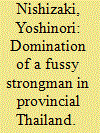| Srl | Item |
| 1 |
ID:
072210


|
|
|
|
|
| Publication |
2006.
|
| Summary/Abstract |
The paper examines the metaphors and dynamics of Atsabe Kemak group identity construction, with a strong emphasis on local cultural 'remembering' of Atsabe history vis-à-vis relations of power. The analysis utilizes the analytical frameworks of Foucault's notion of discourse and Bourdieu's concept of habitus. The secondary burial of a former chieftain highlights the dynamics of Atsabe Kemak responses to new nation-building processes and to international influences that have appeared during the United Nations' transitional administration.
|
|
|
|
|
|
|
|
|
|
|
|
|
|
|
|
| 2 |
ID:
072208


|
|
|
|
|
| Publication |
2006.
|
| Summary/Abstract |
Several scholars portray Thai provincial strongmen as having character traits associated with nakleng - 'tough guys' - who are violent and ruthless toward enemies, but generous and compassionate toward supporters. Banharn Silpa-archa, the strongman of Suphanburi province, does not fit the description however. His personality is reflected in the way he meticulously - fussily - monitors all local development projects. This surveillance pushes otherwise lazy and inefficient local civil servants to be more diligent in their work. Banharn's domination rests on Suphanburians' appreciation of his non-nakleng-type leadership.
|
|
|
|
|
|
|
|
|
|
|
|
|
|
|
|
| 3 |
ID:
072206


|
|
|
|
|
| Publication |
2006.
|
| Summary/Abstract |
In the conventional historiography of Indonesia, the Second World War is equated with the Japanese occupation, and 1942 is a year of sudden change. This article argues that there was a prelude to these conditions. Changes in the global economic structure due to the Second World War, and countermeasures by the state authorities, began well before the Japanese invasion. The fundamental problem was the gradually deepening economic isolation that necessitated state intervention.
|
|
|
|
|
|
|
|
|
|
|
|
|
|
|
|
| 4 |
ID:
072207


|
|
|
|
|
| Publication |
2006.
|
| Summary/Abstract |
The Federal Constitution of Malaysia states that Islam is the religion of the Federation. This provision in Article 3(1), inserted in 1957 when the independence constitution was framed, has drawn considerable scholarly attention in recent years. Most of the studies, however, have not been able to consult the primary constitutional documents. Invariably, many have given varied and ambiguous interpretations of the provision. This article examines the primary constitutional documents and constitutional debates between 1956 and 1957 to trace the origin of Article 3(1) and to determine the intentions of the framers in inserting this provision in the constitution.
|
|
|
|
|
|
|
|
|
|
|
|
|
|
|
|
| 5 |
ID:
072209


|
|
|
|
|
| Publication |
2006.
|
| Summary/Abstract |
The minority tribal groups in the border zones of Southern Thailand (the 'Sakai') are often described as 'disappearing' demographically while the inability to 'know' them at first hand by successive interested parties (the colonial explorer, the naturalist, the government official) has been attributed to their ability to disappear into the jungle, seemingly without a trace. This paper discusses the way the 'Sakai' have faded in and out of ethnology and Thai public consciousness, due in part to their own survival imperatives, and in part to the character of Thai state and society.
|
|
|
|
|
|
|
|
|
|
|
|
|
|
|
|